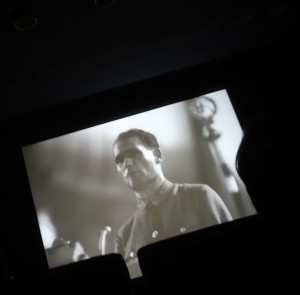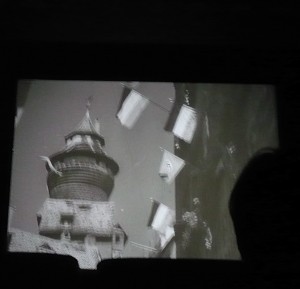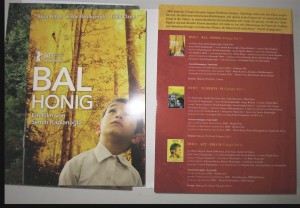Riefenstahl’s Triumph of the Will
A stupid film, which I would not have expected. I have to apologize to Eisenstein, whom I detested as a nasty propagandist in „Battleship Potemkin,“ but who was much more sophisticated, more reflective, and a brilliant perfectionist. Here, there was often visible tinkering – and not just because of the damage to the copy. It’s really touching.
A typical PR product in the sense that it is primarily a logistical achievement. Weren’t the events the greater logistical achievement? Flying them in was already a tried and tested method. The film has no character, no point of view of its own, not much like a modern advertising strip for a corporate identity. It doesn’t go beyond the client’s horizon and suits the taste of the tyrant.
Riefenstahl directed a hundred and fifty henchmen, but was the compliant and clever little girl, a horizon she never exceeded in her entire life. She was too stupid or compliant to prevent the regime’s top brass from exposing themselves. And everyone was probably jealously checking with a stopwatch that they were not being shortchanged. The gang of crooks can be viewed up close. A contemporary document, the only credit. But wasn’t that due to the client?
Like Hitler, who at the end even stylized himself as Mephisto, who wanted to seize souls and take them with him, she borrows from tradition: from Faust 1 and German silent film expressionism. The archaic! The lavish use of pitch torches – with no sense of their introduced symbolic meaning. The fairy-tale quality of the national community portrayed, its age and gender stereotypes. I am moved by the old town of Nuremberg. I understand the Allies‘ hateful zeal of reducing the old Frankish backdrop of German barbarism to rubble and ashes.
 Screenshots Gv – Oct. 2010 „Arsenal“
Screenshots Gv – Oct. 2010 „Arsenal“
The alleged omission of a spoken commentary may have been new in 1934, but it corresponds to the absolute emptiness of the Nazi self-portrayal, which was covered up with increasing difficulty by a sampler of nationalist marching music and occasionally shouted slogans. Hitler then had to appear as a copy of Mussolini. Charles Chaplin’s brilliant parody kept popping up in my head. The fact that the film is said to be ‚the most quoted and given cult status‘ would be a bad sign, also for the state of mind of film buffs and media scientists. It can’t be the fault of the general public that hasn’t seen it for seventy years.
The young expert who gave the introduction was downright enthusiastic. He has been tasked with developing the concept for the „analysis“ by highschool students. Such a piece of crap is not worth the effort, the precious time of education, and is dangerous at best in its hollowness.
What he highlighted about the „famous“ film editing turned out to be hot air. The hundred minutes were very long. We witnessed hour-long marches – as tourists in Berlin are familiar with. Mainly uniformed blocks paraded past the „Führer“, past a bustling audience and again more uniformed blocks. For a change, we saw the „Führer“ and a few loyal followers honoring uniformed blocks a few times. The term „idiots“ fits the film’s appeal. And: despite the vaunted „condensation“ of the party conference, it is only a weak black and white imitation. „If only it gave me the creeps!“ (“Wenn es mich doch gruselte!”)
Again: eternal rest in the archives. Unsalvable! Berlin, after the visit to the „Arsenal“ cinema on October 16, 2010

 zum Vergrößern anklicken
zum Vergrößern anklicken
Arte is broadcasting the exceptionally serious documentary about „Leni Riefenstahl – The End of a Myth“, which is based on research by Nina Gladitz (LINK at wikipedia). The author and her book „Leni Riefenstahl – Career of a Perpetrator“. Orell Füssli, Zurich 2020, ISBN 978-3-280-05730-8 are quoted extensively. (Hopefully she also gets something out of it financially, more than a damp handshake) Balance sheet: fiery ambition with criminal energy, unscrupulous action against competitors in order to be successful, a soul mate of Adolf Hitler, who personally valued and supported her. The appropriation of other people’s creative achievements was not an issue for her, but was the focus of the film feature. Such information should perhaps be translated into foreign languages.